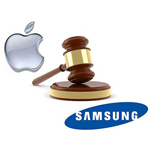
The war and debate between the American multinational corporation, Apple, and the South Korean's multinational corporation, Samsung, continued to the England and Wales High Court.
Since 2011, Apple began litigating against Samsung, its component supplier, in patent infringement suits. The moments of suing and counter-suing by both tech giants highlight their products in a patent war in matters of style, user interface and intellectual property.
The American tech giant recently lost a heated patent battle against Samsung in U.K. courts this past July. Thus Apple was ordered to issue an apology to the Samsung. It follows the U.S. company's failed attempt to block sales of the firm's Galaxy Tab tablets.
A judge at the High Court in London had originally ruled in July that the look of Samsung's Galaxy Tab computers was not too similar to designs registered in connection with the iPad. He said at the time that Samsung's devices were not as "cool" because they lacked Apple's "extreme simplicity".
The US firm had previously been ordered to place a notice to that effect - with a link to the original judgement - on its website with a link entitled "Samsung/Apple judgement" for a one-month period, and place other adverts other publications to "correct the damaging impression" that Samsung was a copycat.
The appeal judges decided not to overturn the decision on the basis that a related Apple design-rights battle in the German courts risked causing confusion in consumers' minds.
A statement from Samsung said: "Should Apple continue to make excessive legal claims based on such generic designs, innovation in the industry could be harmed and consumer choice unduly limited. We continue to believe that Apple was not the first to design a tablet with a rectangular shape and rounded corners and that the origins of Apple's registered design features can be found in numerous examples of prior art."
Apple declined to comment. It can still appeal to the U.K. Supreme Court, otherwise the ruling applies across the European Union.
Apple's Registered Design and Samsung Products
Three judges involved in the Court of Appeal to review the case: Lord Justice Longmore, Lord Justice Kitchin and Sir Robin Jacob.
Apple had reasserted its claim saying that the front face and overall shape of the tablets was the most important factor - rather than the overall design - because users would spend most of their time looking at a tablet's screen and holding it.
One of the judges - who noted he owned an iPad himself - explained why Apple had lost the appeal in his ruling.
"Because this case (and parallel cases in other countries) has generated much publicity, it will avoid confusion to say what this case is about and not about," wrote Sir Robin Jacob.
"It is not about whether Samsung copied Apple's iPad. Infringement of a registered design does not involve any question of whether there was copying: the issue is simply whether the accused design is too close to the registered design according to the tests laid down in the law."
"So this case is all about, and only about, Apple's registered design and the Samsung products."
Sir Robin noted that Samsung's decision to place its logo on the front of its devices distinguished them from Apple's registered design which said there should be "no ornamentation". He also highlighted the fact that the sides of the iPad's design - which featured a "sharp edge" - were significantly different from those of the Galaxy Tabs series.
In addition, Sir Robin wrote that Samsung's designs were "altogether busier" with a more varied use of color on the devices' rear and their inclusion of a thicker section for the camera. International lawsuits.
Apple has now lost a series of lawsuits against Samsung based on the design of their tablets which include cases in the Netherlands, Australia and U.S. - despite sometimes winning temporary sales bans. However, the California-based company has been more successful with other claims.
The Published Statements
The acknowledgement was set to Apple's official website with a tiny link. This was deemed to be "non-compliant" with the order that the court had made in October. The court then ordered Apple to correct the statement – and the judges, indicated that they were not pleased with Apple's failure to put a simpler statement on the site.
At the court in London on Thursday morning, the judge told Apple that it had to change the wording of the statement within 48 hours, carry it on its home page, and use at least 11-point font. Apple tried to argue that it would take at least 14 days to put a corrective statement on the site - a claim that one judge said he "cannot believe".
On 25 October 2012, Apple Inc. published a statement on its U.K. website in relation to Samsung's Galaxy tablet computers. Stating that The statement the Galaxy Tablet Computers, namely the Galaxy Tab 10.1, Tab 8.9 and Tab 7.7 do not infringe Apple’s Community registered design No. 0000181607-0001.
A copy of the full judgment of the High Court is available in the England and Wales High Court (Patents Court) Decisions page. That Judgment has effect throughout the European Union and was upheld by the Court of Appeal of England and Wales on 18 October 2012. A copy of the Court of Appeal’s judgment is available in the England and Wales Court of Appeal (Civil Division) Decisions page from.
Apple also made statements in The Guardian on Friday, November 2, 2012, and a few chosen newspapers in the United Kingdom.
Most notably a U.S. jury proposed Samsung should pay Apple a $1.05 billion (£650 million) fine for infringing several software patents (6 out of 7 patent), and the look and feel of the iPhone. Samsung is appealing the verdict.